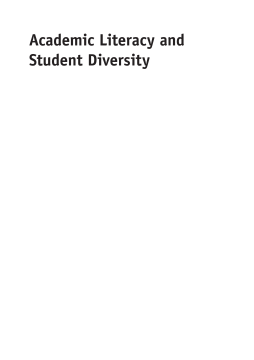
Additional Information
Book Details
Abstract
This book provides a comprehensive overview of approaches to academic literacy instruction and their underpinning theories, as well as a synthesis of the debate on academic literacy over the past 20 years. The author argues that the main existing instructional models are inadequate to cater for diverse student populations, and proposes an inclusive practice approach which encourages institutional initiatives that make academic literacy instruction an integrated and accredited part of the curriculum. The book aims to raise awareness of existing innovative literacy pedagogies and argues for the transformation of academic literacy instruction in all universities with diverse student populations.
In this intelligent and accessibly written book the author shows how the impact of EAP can be most effective when inclusivity is taken to mean not just all students, whether native or non-native English speakers, but extended to include literacy instruction in the subject curriculum and to address all aspects of academic literacy. The book sets out the key issues and gives detailed description of the possibilities for practice that is fresh, lucid and uncluttered. This is a book which will interest anyone working in EAP today.
Ken Hyland, The University of Hong Kong, Hong Kong
Ursula Wingate is Senior Lecturer in Language in Education at King’s College London, UK. Her research interests include English language policies and practices and language teaching methodology. She is joint editor of the Language Learning Journal and on the editorial board of two journals on higher education.
This book is wide-randing in the issues it covers and provides a considered account of what is at stake in discipline-based literacy instruction.
Steve Price, Swinburne University of Technology, Australia
This well written and thoughtful book challenges the public discourse of 'deficiency and remediation' in academic writing. As Wingate points out, widening access to higher education requires recognition that student populations are now more diverse and less prepared for academic study and therefore need positive support when settling into university. The book addresses ways of providing such support in a sensitive as well as a scholarly way and will be a good read for students, faculty and policy people.
Brian Street, Professor Emeritus, King’s College London, UK
is a straightforward account of current academic literacy at the university level. Ursula Wingate reviews relevant literature and summarizes main topics that affect the epistemology and practice of advanced literacy for a diverse population. The clear and straightforward tone will capture the interest of university professionals, especially writing experts and subject lecturers who work with international and non-English speaking students.
Laura Dubcovsky, University of California, Davis, USA
A must-read for every university teacher who's keen to help students of all backgrounds achieve their best. Ursula Wingate has that rare gift of going straight to the heart of the matter, in clear prose, while never losing sight of scholarship. Academic literacy, she persuasively argues, belongs at the epicentre of university learning.
Dai Hounsell, Professor Emeritus, University of Edinburgh, UK
Academic Literacy and Student Diversity is a book that will appeal to both experts
and novices working in the field of academic literacies in higher education. This is not just another textbook on academic literacy but an incisive critique of the often taken-for-granted conceptions of academic literacy and its role in curriculum design and pedagogy. The book is a valuable and welcome contribution to the swiftly growing and reputable New Perspectives on Language and Education series. Adopting a scholarly approach that eschews unnecessary jargon, the author provides a wide-ranging and theoretically grounded overview of approaches to academic literacy and successfully dispels myths
and misconceptions about academic literacy.
Thengani H. Ngwenya, Durban University of Technology, South Africa
This is a book that all teachers of academic literacy at tertiary level...should read, and I strongly recommend it. It provides clear summaries of research and scholarship to date, as well as laying out a pathway for development of the field.
Rosemary Wette, University of Auckland, New Zealand
Table of Contents
| Section Title | Page | Action | Price |
|---|---|---|---|
| Contents | v | ||
| Acknowledgements | vii | ||
| 1 Academic Literacy and Student Diversity: What is the Problem? | 1 | ||
| 2 Approaches to Academic Literacy Instruction | 15 | ||
| 3 Current Practice in Academic Literacy Instruction | 37 | ||
| 4 Discipline-Specific Approaches to Academic Literacy Instruction | 56 | ||
| 5 Reading and Writing | 78 | ||
| 6 Academic Literacy Development and the Student Experience | 102 | ||
| 7 Towards an Inclusive Model of Academic Literacy Instruction | 126 | ||
| 8 Towards the Implementation of an Inclusive Model of Academic Literacy Instruction | 150 | ||
| Appendices | 164 | ||
| References | 172 | ||
| Index | 190 |
